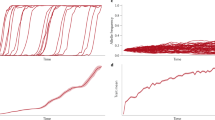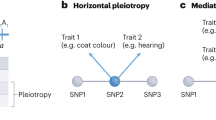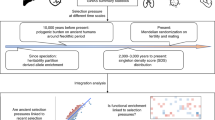Abstract
Drs. Gordon and Sang1 have, very properly, directed attention to the value of studies on the interrelations of environment and genic expression. Some of the most fascinating problems of genetics are to be found in this field ; indeed, we need go no further than the investigations which these two authors have made on the manifestation of the gene 'Antennaless' in Drosophila melanogaster2 to see how much can be accomplished by such researches.
This is a preview of subscription content, access via your institution
Access options
Subscribe to this journal
Receive 51 print issues and online access
$199.00 per year
only $3.90 per issue
Buy this article
- Purchase on Springer Link
- Instant access to full article PDF
Prices may be subject to local taxes which are calculated during checkout
Similar content being viewed by others
References
Gordon, C., and Sang, J. H., NATURE, 149, 610 (1942).
Gordon, C., and Sang, J. H., Proc. Roy. Soc., B, 130, 151 (1941).
Fisher, R. A., "The Design of Experiments" (Edinburgh, 1937).
Mather, K., J. Genet., 41, 159 (1941).
Mather, K., J. Genet., 43, 309 (1942).
Author information
Authors and Affiliations
Rights and permissions
About this article
Cite this article
MATHER, K. The Polygene Concept. Nature 149, 731–732 (1942). https://doi.org/10.1038/149731b0
Issue Date:
DOI: https://doi.org/10.1038/149731b0
Comments
By submitting a comment you agree to abide by our Terms and Community Guidelines. If you find something abusive or that does not comply with our terms or guidelines please flag it as inappropriate.



